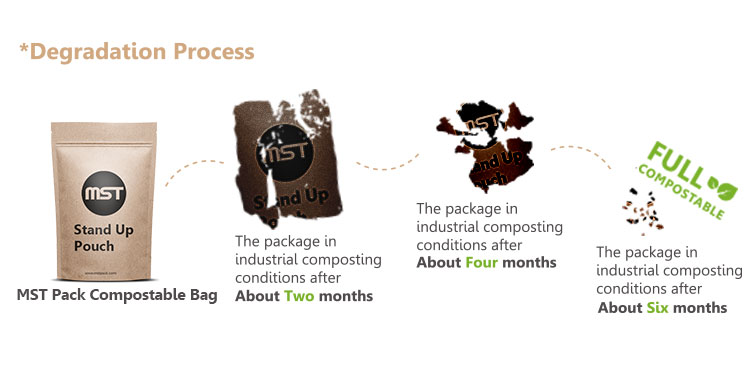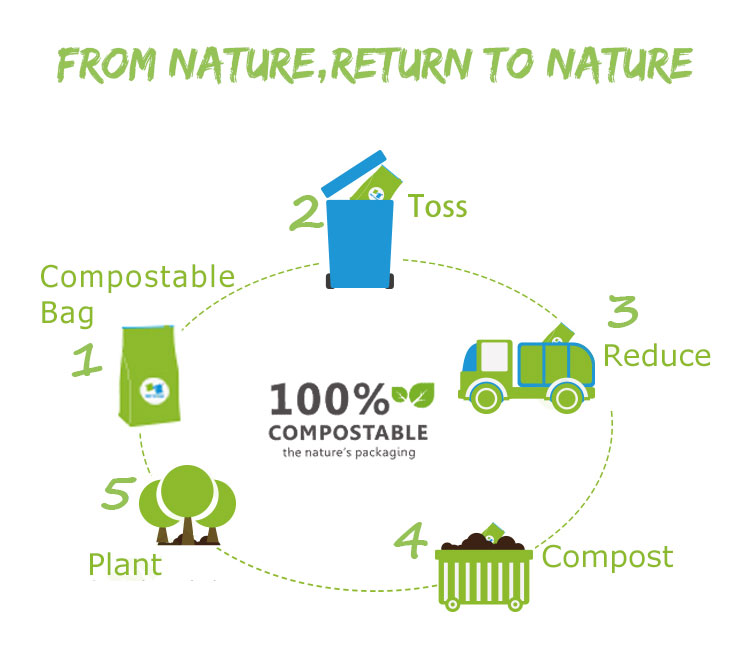Flexible packaging has become an integral part of the modern consumer experience, offering versatility and convenience for a myriad of products. However, the environmental impact associated with traditional packaging materials has prompted a significant paradigm shift toward more sustainable alternatives.
-
Biodegradable Plastics: One of the leading advancements in sustainable packaging is the use of biodegradable plastics. Derived from renewable resources like corn starch and sugarcane, these plastics possess the remarkable ability to break down naturally, mitigating the environmental impact of traditional plastics. MSTPACK has been at the forefront of integrating biodegradable plastics into their packaging solutions, providing eco-conscious alternatives without compromising performance or durability.
-
Compostable Materials: Compostable packaging materials, such as polylactic acid (PLA), are made from fermented plant sugars. Not only are these materials biodegradable, but they can also be composted, contributing to the circular economy by returning valuable nutrients to the soil. MSTPACK has embraced the use of compostable materials in their product offerings, aligning with the growing consumer demand for sustainable and compostable packaging options.
-
Recycled Content: Incorporating recycled materials into flexible packaging is a key strategy in reducing the environmental impact. MSTPACK is dedicated to supporting the circular economy by utilizing recycled content in their packaging solutions. By giving a second life to post-consumer and post-industrial materials, MSTPACK minimizes the demand for virgin resources and helps alleviate the burden on the environment.
-
Paper-Based Packaging: Sourcing paper from responsibly managed forests provides a renewable and recyclable alternative for flexible packaging. MSTPACK recognizes the importance of paper-based solutions and offers a diverse range of eco-friendly packaging options made from sustainably sourced paper. These solutions not only reduce the reliance on non-renewable resources but also contribute to the preservation of forests and biodiversity.
-
Innovative Materials: The pursuit of sustainability has led to the development of innovative materials for flexible packaging. MSTPACK actively engages with and promotes the adoption of cutting-edge solutions such as algae-based plastics and mushroom-based materials. By staying at the forefront of these advancements, MSTPACK demonstrates a commitment to exploring and integrating new materials that push the boundaries of sustainable packaging.
-
Reduced Packaging: Sustainable packaging goes beyond the choice of materials. MSTPACK collaborates closely with its clients to design packaging solutions that optimize material usage while ensuring the necessary protection for products. This approach to reducing excess packaging aligns with a broader commitment to environmental stewardship and responsible resource management.
Conclusion:
In conclusion, the journey toward sustainable flexible packaging involves a multifaceted approach, encompassing the use of biodegradable plastics, compostable materials, recycled content, paper-based solutions, innovative materials, and streamlined packaging design. MSTPACK, as a leading packaging supplier, not only acknowledges the environmental challenges posed by traditional packaging but actively takes steps to address them. Through the integration of eco-friendly raw materials and a commitment to innovative, sustainable practices, MSTPACK is shaping the future of flexible packaging by promoting a harmonious balance between consumer convenience and environmental responsibility.


